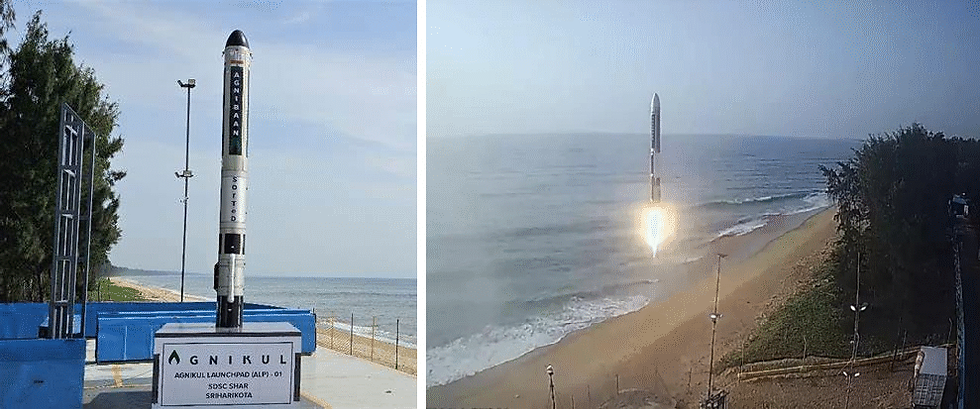Agnikul Cosmos Launches World’s First Rocket with Single-Piece 3D-Printed Engine
Agnikul Cosmos, an India-based aerospace startup incubated at IIT Madras, has successfully launched the world’s first rocket powered by a single-piece 3D-printed engine. The Agnibaan rocket took off at 7:15 AM from the Sriharikota island spaceport off the Andhra Pradesh coast, marking a significant milestone in the global commercial satellite market.
The Agnibaan rocket, a single-stage sub-orbital technology demonstrator named SOrTeD, reached a height of 5.6 km before completing a parabolic flight and descending into the Bay of Bengal. This brief yet groundbreaking flight of 65 seconds was designed to validate homegrown technologies, gather critical flight data, and ensure the functionality of launch systems.
Powered by Agnikul's proprietary Agnilet engine, the rocket showcases a semi-cryogenic engine that uses a kerosene-like fuel combined with liquid oxygen. This engine, easier to handle than traditional cryogenic engines, is notable for being fabricated entirely through 3D printing. According to Satyanarayanan R. Chakravarthy, professor of aerospace engineering at IIT Madras and a founding adviser to Agnikul, the use of 3D printing slashes the engine manufacturing time from a month to just three days.
The successful launch was the culmination of thousands of hours of dedicated effort from Agnikul's team of over 200 engineers, guided by 45 former ISRO scientists. The company's co-founder and CEO, Srinath Ravichandran, highlighted the significance of the achievement, crediting the unwavering support of advisors, investors, vendors, customers, and well-wishers.
ISRO Chairman S Somanath praised the achievement, noting that it demonstrates the prowess of indigenous design and innovation. He emphasized ISRO's commitment to supporting space startups and non-governmental entities to foster a vibrant space ecosystem in India.
Agnikul Cosmos aims to revolutionize the commercial satellite launch market by offering customizable solutions for payloads ranging from 30kg to 300kg in low Earth orbit. The company plans to conduct its first orbital mission by the end of the financial year 2024-25, with regular customer flights expected to commence in 2025.
The launch also marked the debut of Dhanush, India's first private launchpad at the Satish Dhawan Space Centre. Dhanush, consisting of the Agnikul Launch Pad (ALP) and the Agnikul Mission Control Centre (AMCC), is designed to ensure operational reliability and consistency during launches.
This historic event signals a new era of innovation and rapid assembly capabilities in rocket technology, inspiring the next generation of entrepreneurs and establishing India as a key player in the global space industry.
Reference:




Comments